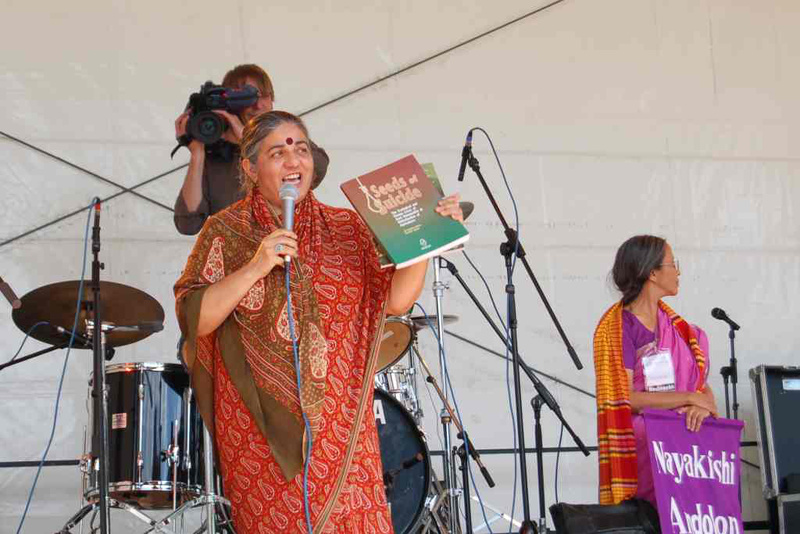Menu

Women from Planet Diversity: their news
Vandana Shiva
Vandana Shiva's most recent book, Soil not Oil: Environmental Justice in an Age of Climate Crisis is on the close connection between food shortages and high food prices, hunger and climate change. And solutions to these crises.
Book review:
Citizens of an Earth Democracy: Vandana Shiva Offers a Vision for our Times.
Farida Akhter
Farida Akhter on Climate Change and Population
As the December 2009 Copenhagen climate summit was about to start, we received this important analysis from longtime Bangladeshi activist-researcher Farida Akhter: "Climate Change and Population: the old game of blaming women and the poor." more
On women's action against the Tipaimukh Dam: Farida Akhter was part of a women's solidarity tour to the region to be affected by a major Indian dam, and wants to inform others and win international support.
Women from Planet Diversity
many voices, worldwide

See the Planet Diversity demonstration, festival and conference on food, agriculture, biological and cultural diversity.
People from around the world talk about safe food, free from genetic engineering, and the problems with industrial global agriculture. There are alternatives!
See information on the women's workshops at Planet Diversity here.
More information about women and biodiversity and the next Convention on Biological Diversity on our site here.
Background
In May 2008 a new planet was spotted for a few days in Bonn, Germany: a bright 'critical mass' of people and projects from around the world focused on ways to meet current crises of hunger, rising food prices, loss of biological and cultural diversity, and climate change.
The occasion, the 9th UN Convention on Biological Diversity and its Cartagena Protocol on Biosafety. The place, the Planet Diversity demonstration and festival of diversity, May 12th, 2008, followed by a three day international conference of 700+ people from 100 countries. These are well documented on the Planet Diversity website.
Such a large event can be seen and experienced in many ways. Berlin filmmakers Kirsten Wagenschein and Michael Zimmer agreed to document the women's program of Planet Diversity, working with its organizers, Anna Gyorgy of “Women and Life on Earth e.V.” and Sabine Brückmann, of the international network “Women in Europe for a Common Future. Happily, the German “filia foundation” for women and girls was able to support the project.
It was clear that the two 'women's workshops' would be filmed, and key participants interviewed. But while the organisers were off and busy, the two filmmakers filmed events around Planet Diversity with an eye for different stories and voices and a deep interest in north-south and globalisation themes.
The first product of their 20 hours of taping is “Women from Planet Diversity”, a 45 minute collection of sights, sounds and expertise from some of those who made Planet Diversity possible. We hear from students, environmental and farm group members and well-known activists like Vandana Shiva from India and Farida Akhter from Bangladesh.
Background: the challenges
The dramatic loss of biodiversity and seemingly unstoppable climate change are the greatest ecological challenges of our time. Food and agriculture are central to these global problems. Increasing industrialisation, monopolisation and the standardisation and globalisation of agriculture and food production are not the answer, but make the things worse.
Women are key to both the present and future of sustainable agriculture. They are the collectors of seeds, the keepers of traditional knowledge of plants for food and health. Despite this, they are often prevented from owning or using land effectively, and can lack legal rights, appropriate technology and knowledge. Other problems include the industrialisation of agriculture, which destroys both biological and cultural diversity, and genetically modified (GMO) seeds, which – along with their health, safety and ecological risks -- cannot be saved, and lock producers into expensive contracts for seed, fertilizers and pesticides. These are some of the issues addressed in the film, along with solutions.
Shortly before Planet Diversity took place, the International Assessment of Agricultural Knowledge, Science and Technology for Development (IAASTD) issued its initial report, based on four years of work by some 400 experts. A main conclusion was that diversified small farming and regional markets are key to fulfilling future food needs. The current model of industrial agriculture with its high oil and water use cannot guarantee food security and sovereignty. The report is important to “Women from Planet Diversity” activists, and is mentioned as the film opens.
For more information: Women and Life on Earth e.V.: www.wloe.org
* Women in international cooperation for peace, ecology and social justice (German assoc.)
Women in Europe for a Common Future: http://www.wecf.eu/
For extensive documentation of Planet Diversity: www.planet-diversity.org
International Assessment of Agricultural Knowledge, Science and Technology for Development or IAASTD http://www.agassessment.org
Download the 34 page Executive Summary of the Synthesis Report at:http://www.agassessment.org/docs/IAASTD_EXEC_SUMMARY_JAN_2008.pdf
Download this information in 2 pg. pdf format.


